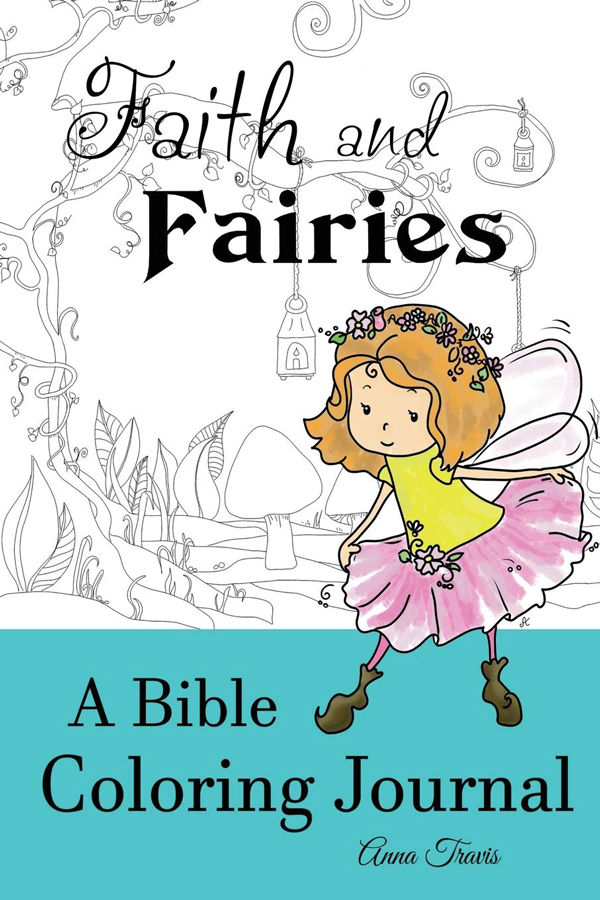
For hundreds of years, fairies have been prevalent in fantasy literature and folklore. In the last twenty years, they are becoming more and more popular and even appear in Bible journaling. I've had concerns about seeing fairies on Bible journal pages. Call me overzealous. I don't see how this kind of folklore is of representative of God's Word.

I know others see them as cute and not a problem I think it is important to be careful what kind of message we give to the world. In my opinion, decorating God's Word with magic and mischief is not a good message.
Most Christians still believe the Bible is sacred and believers need to honor the Word. Decorating the Word with demonic creatures from Greek Mythology seems irreverent to me. But when you live in the "world" daily you lose perspective.
What is even more concerning to me is when I questioned why we would want to merge God's Word with fairy creatures I was met with an amazing amount of resistance, justification, and eye-rolling. It is concerning when one is so in tune and defending using the "world's creatures" as representative of than God-given Scriptures there is a problem.
I've been studying Zerubbabel, Ezra, and Nehemiah this month and I wondered what they would think of the Torah being decorated by mythical creatures. In my opinion, several things like Mickey Mouse, mermaids, and fairies in Bible journaling are examples of conforming to the world. They are silly.
What Does the Bible Say?
Have nothing to do with irreverent, silly myths. Rather train yourself for godliness. 1 Timothy 4:7
"Silly myths" are false beliefs and practices. These concepts are not supported by Scripture; in fact, they contradict God's Word. They are the kinds of teachings that foolish people would debate, not devout Christians. Titus was likewise warned by Paul regarding "Jewish fables" (Titus 1:14). In his second letter to Timothy, Paul warned him about the same "fables" (2 Tim. 4:4).
Paul advised Timothy to stick to "the sound doctrine that you have closely followed up to this point" (1 Tim. 4:6b). He cautioned him not to "pay attention to falsehoods and lengthy genealogies" (1 Tim. 1:4).
See to it that no one takes you captive by philosophy and empty deceit, according to human tradition, according to the elemental spirits of the world, and not according to Christ. Colossians 2:8
How can false teachers capture people? "Captives” do not know God's Word. They are captivated by the silly worldviews and delusions. A false teacher's philosophy is "hollow and deceitful."
Are you condemning ladies because their Bible journal with faires? Of course not. I'm asking everyone to look at the history and pray about it and consider how it looks. Just like I wouldn't tell someone not to wear a bikini, I would hope you would understand that wearing a bikini to church would be in bad taste.
Therefore, I updated the Facebook Group rules to say Bible journaling with fairies, and mermaids, and other ungodly creatures are not allowed.
One Question
The origin of any teaching is tested by asking one question: Is it God's or man's teaching? In ancient Greece, this phrase meant “universal elemental energies, angelic influences on heavenly bodies.” It was a term used in that era's religious astrology. Their belief in the power of the heavenly bodies and angels was widespread. Demonology and angelology were not authentic Christian beliefs. Such teachings were diabolical. We should avoid horoscopes, astral charts, Ouija boards, and other spiritist rituals since they are not after Christ. The whole zodiac system is against God's Word. Anyone practicing mysticism or the occult is asking for problems.
Magic is the acquired ability to defy natural rules, which are, of course, God's laws governing and maintaining His creation. You can learn "magic" by studying and practicing certain methods like Harry Potter did at Hogwarts, the wizarding school, or by acquiring "magical" artifacts such as a crystal ball, witches' broom, or a flying carpet (I don't think Harry Potter should be decorating our Bibles either).

This is extremely similar to what the Bible calls witchcraft. The Egyptian magicians recreated God's first few miracles through Moses, then threw up their hands in despair. In 1 Samuel 28, we have the Witch of Endor, who appears shocked and terrified when the apparition of Samuel appears in response to her mumbo jumbo. The idea is that when miraculous things happen in the Bible, they happen by the power of God, not man.
The History of Fairies
Fairies are frequently portrayed in popular culture as pleasant small winged creatures endowed with mystical abilities. The past, on the other hand, tells a completely different picture of fairies.
Fairy myths and legends do not have a single origin, but rather are a collection of folk beliefs from various origins. Various folk theories concerning the origins of fairies include portraying them as either demoted angels or demons in Christian belief systems, deities in Pagan belief systems, spirits of the dead, prehistoric antecedents to humans, or spirits of nature.
The word Fairy derives from Latin words that indicate "fate." Fairies were regarded in folklore as mysterious entities with the ability to perform both good and evil. Fairies were typically mischievous and dabbled in tomfoolery in fairy folklore. Fairies can be traced back to Greek mythology, where they were known as Nymphs. These nymphs guarded Mother Earth's face. England hypothesized a new notion of fairies in the 13th century, describing them as "small beings" with or without wings who were either kind or bad.

Fairies were eventually explained as "fallen angels" by the English mythical beliefs and Christianity. They thought fairies were good enough for hell but not good enough for heaven, so they were banished to Earth. Fairies have always been associated with slender, lovely females. Various sorts of fairies, such as leprechauns, goblins, elves, enchanters, fay, genies, gnomes, goblins, gremlins, hobs, mermaids, nymphs, pixies, and many more, were introduced with cultural and theological evolution.
The Growing Popularity of Faries
In recent years, novels and stories about all things fairy have grown increasingly popular, particularly in young adult fiction. Why are so many drawn to the world of fairy or faerie, particularly the darker aspects of tales and legends?
When this question was asked one author said:
I think this is exactly why audiences are fascinated with the fey. They’re beautiful, seductive, mysterious, dangerous, and alluring, and we can’t help but be drawn to that....
From tiny brownies to deadly beautiful fey princes, to talking cats and faery queens, to bloodthirsty redcaps and brilliant faery tricksters, the world and legends of Faery has everything a fantasy lover could want. For authors and readers alike. They might be dangerous, they might be infuriating, seductive, devious and amoral, but when dealing with faeries, one thing is for certain. You might be eaten, seduced, made to dance forever or turned into a hedgehog for all time, but you will never be bored.1
According to the Bible, they are silly. Just as the easter bunny, mermaids, and Santa Clause are silly and not worth or time.
In the same way we also, when we were children, were enslaved to the elementary principles of the world. Galatians 4:3
Submit yourselves therefore to God. Resist the devil, and he will flee from you. James 4:7
















